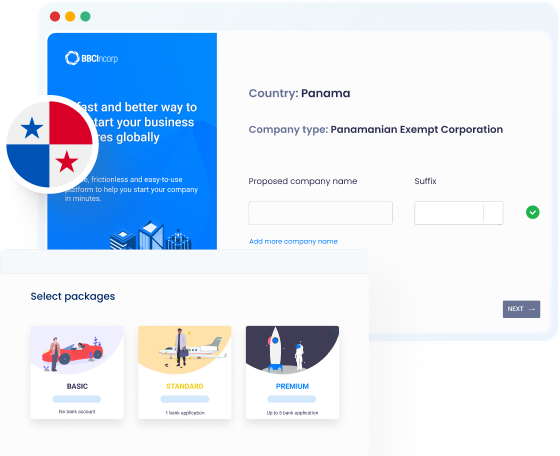Navigating the World of International Service: Insights on Offshore Company Formation
Offshore Company Formation presents a calculated opportunity for international business operations. It provides significant advantages, such as tax optimization and improved privacy. The procedure is not without its difficulties. Recognizing the intricacies of regulative requirements and numerous territories is important. As services think about these options, the steps included can significantly impact their lasting success. What are the vital variables that can bring about effective overseas management?
Comprehending Offshore Business: Interpretation and Purpose
Offshore companies have actually come to be a prime focus in global company conversations due to their distinct legal and economic frameworks. These entities are developed in jurisdictions outside of the proprietor's nation of residence, typically with favorable governing atmospheres. Usually, offshore business offer different functions, such as asset defense, tax obligation optimization, and enhanced personal privacy. They can operate in several sectors including trade, financing, and innovation, offering versatility for global operations.The specifying characteristic of an offshore Company is its ability to conduct business worldwide while gaining from decreased tax obligation obligations and regulative worries. This structure charms to business owners and investors looking for to diversify their portfolios and handle dangers efficiently. In addition, several offshore jurisdictions use motivations to attract international financial investment, causing a boost in the Formation of these business. Understanding the meaning and purpose of offshore firms is vital for navigating through the intricacies of international business and funding flow.
Key Benefits of Offshore Company Formation
The Formation of an overseas Company provides numerous engaging benefits that attract business owners and capitalists alike. Among the main benefits is tax optimization; numerous territories offer positive tax prices or exceptions, permitting companies to make the most of earnings. In addition, offshore business often delight in greater confidentiality, as numerous jurisdictions have rigorous personal privacy regulations safeguarding the identities of Company proprietors and shareholders.Another significant advantage is property security. Offshore entities can guard assets from political instability and financial slumps in the owner's home country. These business can help with worldwide trade, giving very easy access to international markets and streamlining cross-border transactions.The adaptability in business structure likewise charms to service proprietors, as overseas firms can be customized to fulfill particular operational demands. Overall, the critical Formation of an offshore Company can cause boosted monetary safety and security, operational effectiveness, and a durable international presence.

Common Challenges in Developing Offshore Entities
Establishing offshore entities offers several obstacles that organizations have to browse. Secret issues include governing compliance, which can differ substantially throughout jurisdictions, and the impact of social differences on operations. In addition, companies should think about the threats and expenses related to keeping an offshore existence, which can influence total viability.
Regulatory Conformity Issues
Steering regulatory conformity concerns positions considerable challenges for companies when they look for to develop offshore entities. Each territory has its own collection of regulations and regulations, which can differ commonly and may be hard to browse. Business frequently encounter difficulties associated to tax conformity, anti-money laundering regulations, and reporting demands. Furthermore, changes in worldwide tax laws can produce uncertainty, making it important for organizations to stay upgraded on conformity responsibilities. Failure to comply with these policies can result in extreme charges, including penalties and reputational damages. Consequently, understanding the legal framework and engaging with regional professionals is necessary for effective offshore operations, guaranteeing that companies can run within the confines of the law while maximizing their international method.
Cultural Distinctions Impact

Cost Factors To Consider and Threats
Guiding via the economic landscape of offshore entity Formation provides various price factors to consider and inherent risks. Initial arrangement costs usually consist of lawful charges, enrollment expenses, and compliance fees, which can collect considerably. Additionally, recurring maintenance costs such as yearly costs and bookkeeping solutions should be factored in. In addition, rising and fall regulatory settings in different jurisdictions posture risks, potentially causing legal issues or unanticipated costs. Organizations might also experience difficulties related to tax, banking, and reputational concerns, which can affect profitability and operational performance. Possible entrepreneurs have to conduct comprehensive due diligence and monetary projecting to reduce these dangers and ensure sustainable growth. Recognizing these cost considerations is crucial for effective offshore organization ventures.
Actions to Establish an Offshore Company
Establishing an offshore Company entails several crucial actions that require cautious factor to consider. Secret variables consist of picking the suitable jurisdiction and making certain conformity with regional laws, along with collecting necessary paperwork. Recognizing these aspects is essential for an effective overseas organization setup.
Picking the Right Territory
Choosing the appropriate territory is essential for any person looking to establish up an offshore Company, as it can greatly influence business's legal responsibilities, tax obligations, and operational ease. Different variables must be considered, including the political stability, regulatory atmosphere, and tax obligation incentives provided by prospective jurisdictions. Popular selections frequently include countries with desirable tax obligation routines, such as the British Virgin Islands or Cayman Islands, due website to their reduced or zero tax rates. In addition, the convenience of doing service and the credibility of the jurisdiction can affect financier self-confidence and market accessibility. Eventually, a knowledgeable choice based on extensive research will certainly guarantee the offshore Company is placed for long-lasting success and conformity with international standards.
Called For Documents and Compliance
When setting up an overseas Company, recognizing the essential documents and conformity demands is vital to assure a smooth procedure. Trick files typically include a certification of unification, a memorandum and short articles of organization, and evidence of identification for shareholders and directors. Some jurisdictions might call for additional information, such as service strategies or bank referrals. Compliance with local legislations is vital, which typically entails designating a registered representative and maintaining an authorized office. Regular reporting and adherence to tax obligations should additionally be thought about. Failing to follow these demands can bring about fines or even dissolution of the Company. Extensive preparation and assessment with lawful experts can assist navigate these complexities efficiently.
Choosing the Right Jurisdiction for Your Offshore Company
Just how can one determine one of the most ideal territory for an overseas Company? Selecting the ideal territory needs cautious factor to consider of numerous factors. First, the lawful and tax obligation atmosphere plays a vital duty; territories with desirable tax obligation routines may improve service earnings. Furthermore, the political security and economic environment of a place can influence long-term service viability.Another essential aspect is the availability of monetary solutions and banking infrastructure, which assist in smooth procedures. Potential company owner ought to additionally think about the simplicity of working, including the rate of enrollment and the clarity of regulations.Furthermore, language barriers and cultural distinctions can influence operations; therefore, straightening with a jurisdiction that straightens with business goals and individual comfort is crucial. Ultimately, complete research and professional advice can direct business owners in making a notified choice that lines up with their strategic purposes.
Compliance and Governing Factors To Consider

Best Practices for Handling an Offshore Business
Handling an overseas business needs critical planning and careful implementation to optimize performance and alleviate threats. First, developing a durable conformity structure is vital to browse varying laws throughout jurisdictions. Routine audits and danger analyses aid determine prospective vulnerabilities.Moreover, leveraging neighborhood competence with collaborations with local experts can enhance functional efficiency and cultural understanding. Making use of technology, such as cloud-based administration systems, streamlines interaction and information management, allowing much better decision-making. Furthermore, keeping clear economic documents and ensuring prompt tax obligation filings are important to promote the Company's integrity. Buying team training and growth fosters an experienced labor force, advertising innovation and adaptability.Finally, developing clear performance metrics and key efficiency signs (KPIs) helps evaluate company development and educate strategic changes. By sticking to these ideal techniques, business can successfully manage their offshore operations, guaranteeing long-term success and sustainability in an affordable worldwide industry.
Often Asked Inquiries
What Is the Price of Creating an Offshore Company?
The cost of developing an offshore Company differs commonly depending on territory, legal demands, and services required. Usually, costs can range from a couple of hundred to numerous thousand dollars, consisting of enrollment, compliance, and yearly costs.
Exactly how Lengthy Does It Take to Develop an Offshore Entity?
The time required to develop an offshore entity differs substantially, typically varying from a few days to numerous weeks (offshore company formation). Aspects influencing this period include territory, required documentation, and the performance of the company entailed
Can People Form Offshore Companies Without a Service Companion?
People can certainly create overseas business without a company companion. Many jurisdictions enable single-member entities, encouraging entrepreneurs to develop and handle their businesses independently, while still gaining from potential tax advantages and legal securities.
Exist Any Kind Of Tax Advantages for Foreign Investors?

What Kind Of Companies Commonly Make Use Of Offshore Firms?
Offshore firms are frequently made use of by various markets, including financing, modern technology, and ecommerce. These entities frequently offer functions such as possession defense, tax obligation optimization, and privacy, interesting both international firms and individual business owners. Offshore companies have come to be a focal point in global organization discussions due to their unique legal and economic structures. They can operate in multiple sectors including financing, trade, and modern technology, providing versatility for worldwide operations.The defining feature of an overseas Company is its capacity to perform organization worldwide while benefiting from reduced tax obligation liabilities and regulative worries. Additionally, overseas firms often enjoy better confidentiality, as numerous jurisdictions have stringent personal privacy legislations securing the identities of Company proprietors and shareholders.Another considerable advantage is asset protection. These firms can promote international trade, giving very easy access to global markets and streamlining cross-border transactions.The versatility in company framework likewise appeals to company proprietors, as offshore business can be tailored to fulfill specific functional requirements. Picking the ideal jurisdiction is vital for any person looking to establish up an offshore Company, as it can greatly impact the business's legal obligations, tax obligation responsibilities, and functional ease.